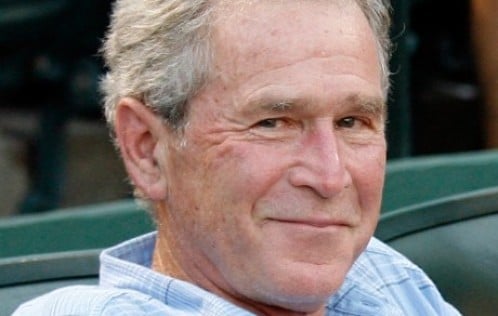“Our democracy is only as good as people trust the results,” former President George W. Bush declared in a presumably well-paid speech last week in the United Arab Emirates, a notorious Arab dictatorship. Bush is being exalted as if he is the second coming of George Washington thanks to his implied slams against the Trump administration. But Bush’s actions during his eight year reign did far more to ravage democracy at home and abroad than most people realize.
Thanks to gushing media coverage, Bush is enjoying one of the greatest comebacks in modern American history. In the summer of 2008, only 22 percent of Americans approved of Bush and 41 percent said he was the “worst president ever.” Last month, a poll showed that 61 percent of Americans now approve of Bush, and his support among Democrats quintupled, from 11 percent in early 2009 to 54 percent now. If Americans want to understand current political challenges, they need to recall Bush’s forgotten debacles.
Speaking in New York in October, Bush called for “a new, 21st century American consensus on behalf of democratic freedom and free markets.” But when he was president, Bush’s policies assumed that spreading democracy gave him a license to kill.
Shortly before he invaded Iraq in 2003, Bush assured a Washington think tank:
The nation of Iraq — with its proud heritage, abundant resources and skilled and educated people — is fully capable of moving toward democracy and living in freedom.
Though he invoked democracy to justify the war, U.S. military commanders three months after the fall of Baghdad “ordered a halt to local elections and self-rule in provincial cities and towns across Iraq, choosing instead to install their own handpicked mayors and administrators, many of whom are former Iraqi military leaders,” the Washington Post reported. Many Iraqis were outraged to see Saddam’s former henchmen placed back in power over them. But, as Noah Feldman, the Coalition Provisional Authority’s law advisor, explained, “If you move too fast, the wrong people could get elected.”
The Bush administration only agreed to Iraqi elections after massive street protests demanding the right to vote. Bush reportedly authorized massive covert aid to pro-American Iraqi parties and politicians. However, when senior members of Congress such as Nancy Pelosi were briefed on the plan, they vehemently objected. Bush canceled the formal plan but delivered covert aid anyhow, using back channels and undercover operators kept secret from Congress as well as the American public.
Iraq’s 2005 election was more akin to a Soviet Bloc referendum than a New England town meeting. As part of Operation Founding Fathers,American troops traveled around broadcasting a get-out-and-vote message at the same time they raided people’s homes. After soldiers passed out thousands of sample ballots, the top UN election officialcondemned U.S. military interference. Bush proclaimed the elections a “resounding success” but despite CIA handouts, pro-U.S. candidates were crushed by pro-Iranian parties. The animosities inflamed by the election campaign helped propel Iraq to civil war, which Bush invoked the following year to justify sending far more U.S. troops there.
Bush has recently fretted about Russian involvement in American elections but when he was president, Bush acted las if the United States was entitled to intervene in any foreign election he pleased. He boasted in 2005 that his administration had budgeted almost $5 billion “for programs to support democratic change around the world,” much of which was spent to tamper with foreign elections.
The Bush administration spent over $65 million to boost their favored candidate in the 2004 Ukraine election, including “helping to underwrite exit polls indicating he won a disputed runoff election,” according to the Associated Press. Yet, with boundless hypocrisy, Bush proclaimed that “any (Ukrainian) election … ought to be free from any foreign influence.”The Bush administration rushed $2 million to aid the ruling Fatah party to help them thwart Hamas in a 2005 Palestinian election, to no avail. U.S. government-financed organizations helped spur coups in Venezuela in 2002 and Haiti in 2004. Both of those nations remain political train wrecks.
Read the full article at The Hill.


